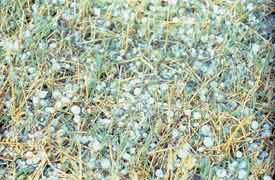
Agricultural News
Crop Insurance Subsidy Reforms Could Save Tens of Billions in 2012 Farm Bill
Wed, 11 Jul 2012 14:34:40 CDT

A new report shows that Congress could save taxpayers at least $42 billion over 10 years, provide farmers with a more fiscally and environmentally responsible safety net and avoid deep cuts to vital nutrition and conservation programs by scaling crop insurance subsidies back to more reasonable levels.
The report, authored by renowned economics professor Dr. Bruce Babcock of Iowa State University, explores the cost savings and other advantages of returning to the premium subsidy structure that was in place before the Agricultural Risk Protection Act (ARPA) became law in 2000.
"The crop insurance industry would bear most of the cost as farmers switched to cheaper insurance products that are less profitable to sell and service and that garner smaller federal subsidies," Dr. Babcock writes. "The industry would see lower profits but would still be financially viable. Perhaps most importantly, farmers would still have access to the same types of insurance that they buy today."
In a drive to get farmers to insure more of their crops, Congress voted in 2000 to make changes to how federal crop insurance works, more than doubling the premium subsidies. Dr. Babcock argues that this was the wrong solution to a real problem - overly expensive premiums for higher levels of coverage. The cost of subsidizing these premiums has exploded from $1.5 billion in 2002 to $7.4 billion in 2011.
Dr. Babcock concludes that taxpayers would have saved at least $4.2 billion in 2011 alone if Congress had not increased premium subsidies in 2000. The savings would actually become much greater as farmers responded by buying less expensive insurance products that met their risk management needs more cost effectively. Instead of increasing premium subsidies, Dr. Babcock says Congress should have fixed the flawed system used by the U.S. Department of Agriculture to price the policies. USDA subsequently fixed the premium pricing problems, but the exorbitant subsidies remain in place.
"House lawmakers debating the 2012 farm bill this week should at the very least consider reasonable reforms, such as phasing premium subsidies back to where they used to be," said Craig Cox, Environmental Working Group's senior vice president of agriculture and natural resources. "Dr. Babcock's analysis shows that over-inflated subsidies are no longer needed to encourage producers to buy crop insurance, and the savings achieved by scaling back subsidies could cut the deficit, sustain a strong safety net, protect funding for programs that help hungry kids, protect our environment and open the door to innovative private sector solutions to farmers' risk management challenges."
Rep. Jeff Flake (R-Ariz.) today introduced The Crop Insurance Subsidy Reduction Act to bring the premium subsidy structure back to pre-2000 levels in recognition of the fact that the higher subsidies have achieved their goal of increasing growers' participation in the crop insurance program and are no longer needed thanks to better policy pricing by USDA's Risk Management Agency.
Dr. Babcock's report makes it clear that the reforms proposed by Rep. Flake would not threaten the safety net for farmers.
"Eliminating the distorted incentives would encourage them to rely more heavily on alternative forms of risk management," writes Dr. Babcock. "There might be a small drop in the number of acres insured, but by far the biggest change would be in the type of insurance products and the coverage levels that farmers would buy."
WebReadyTM Powered by WireReady® NSI
Top Agricultural News
More Headlines...


















